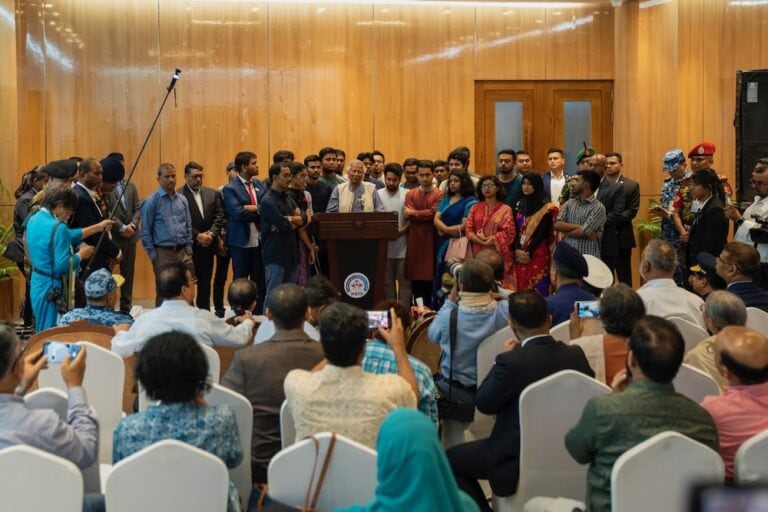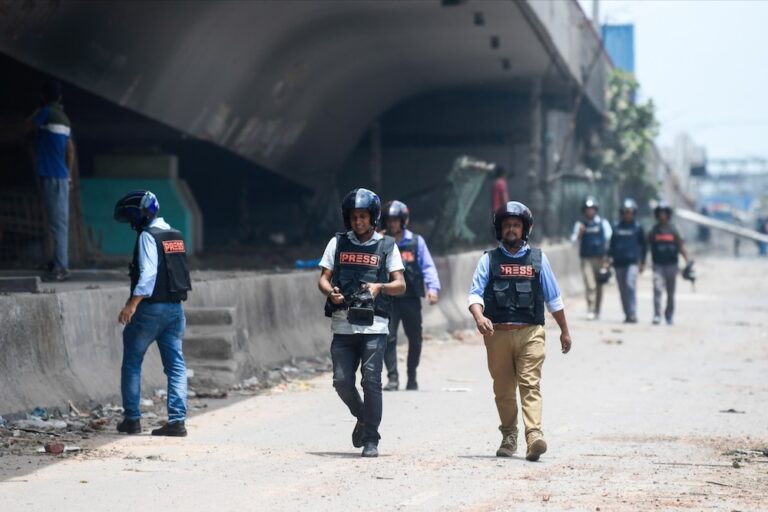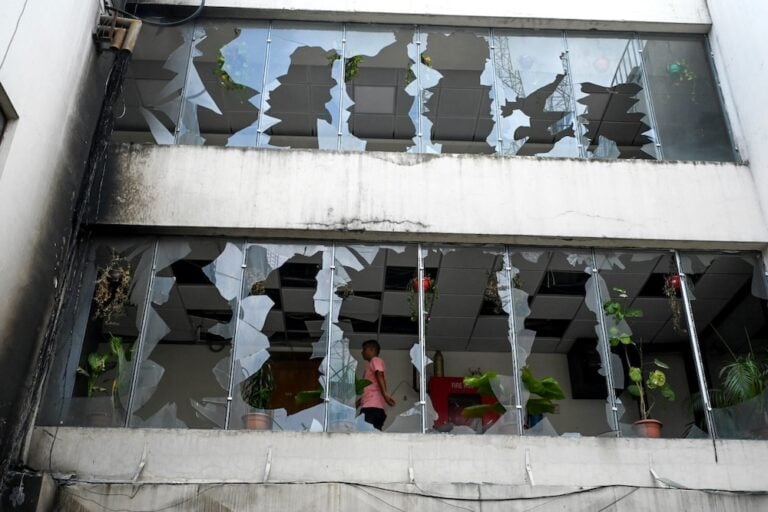(WiPC/IFEX) – The Bangladesh “Janakantha” daily newspaper writes that during a press conference held in Dhaka on Monday 5 October 1998, Bangladesh Foreign Minister Abdus Samad Azad told journalists that the case of Taslima Nasrin “should be considered from an humanitarian angle.” He went on to say “On the one hand, the religious sentiment of […]
(WiPC/IFEX) – The Bangladesh “Janakantha” daily newspaper writes that during
a press conference held in Dhaka on Monday 5 October 1998, Bangladesh
Foreign Minister Abdus Samad Azad told journalists that the case of Taslima
Nasrin “should be considered from an humanitarian angle.” He went on to say
“On the one hand, the religious sentiment of the people should be respected,
but we cannot allow any excesses in the name of religion.”
**For previous alerts and background information, see IFEX alerts of 18
September 1998, 24 February, 16 January, 7 January, and others**
This first public statement from a senior government official is in reaction
to the demonstrations sparked by the return of writer Taslima Nasrin to
Bangladesh after over four years abroad. Some of the demonstrators have
allegedly called for Nasrin’s execution
on charges of “blasphemy.”
Background Information
On 15 September 1998, on learning that her mother was terminally ill with
cancer and close to death, Nasrin decided to return to Bangladesh. According
to newspaper reports, she was recognised by a fellow passenger on the plane.
She immediately went into
hiding. On learning of her return, the militant groups which had protested
against her in 1994 renewed their campaign. However, this time the level of
protest was much lower, probably because of the need to concentrate on the
massive flooding of large parts
of the country.
On 25 September, an individual filed a personal complaint against Nasrin to
the Keranigang Magistrates Court. The complaint was issued under Article
295a of the Penal Code, as before, but this time related to a book published
in 1991/2 by Nasrin entitled
“Selected Columns”. Specific pages are referred to in the complaint, all of
which question women’s marriage and property rights under Muslim law.
Lawyers say that it is unlikely to progress through the courts, as an
individual cannot file a complaint under Article 295a without the sanction
of the government, which it shows no intention of doing. The fear is
that the complainant is aware of this, but that the purpose of the action is
to force Nasrin from hiding as she is required by law to appear in a court
to apply for bail. Once an arrest
warrant is issued, a period of one month may elapse without the defendant
appearing before a court. Once that time has passed, the defendant can be
considered an “absconder” and their possessions seized. Nasrin will thus not
be required to appear at a court any earlier than 25 October.
International PEN has spoken to Taslima Nasrin in Dhaka and she appears in
good spirits. She informed PEN that she and her lawyers are trying to find a
means of getting her bail
application heard in absentia, or, failing that, that the government provide
her with police protection should she have to appear in court. The
Bangladesh authorities have reportedly
suggested that she should leave the country, but Nasrin says that she would
prefer to stay in Bangladesh to be near her mother. The Foreign Minister’s 5
October statement appears to show that Nasrin’s requests for protection
against attack will be met with some sympathy.
Nasrin had been living abroad since her flight from Bangladesh in August
1994, after a series of demonstrations calling for her execution and a court
case was initiated against her.
Nasrin’s case first came to PEN’s attention in September 1993 when reports
were received that a little known militant Muslim youth group had demanded
that Nasrin be executed for having committed “blasphemy.” Their anger had
been roused by Nasrin’s book, “Shame”, published earlier that year, which is
a fictionalised account of relationships between Hindus and Muslims in
Bangladesh following the destruction of a mosque in Ayodhya in India in
1992.
In the following months, protests against Nasrin initiated by extremist
Muslim groups grew, and reports suggested that at least one bounty had been
offered for her death. Her other writings, mostly on women’s issues and
critical of aspects of Islam, also came under scrutiny by Muslim extremists
and were included in their protests against her. At their height, in
mid-1994, the demonstrations against Nasrin reached 10,000 people, and
strikes closed parts of major cities. At that time, Nasrin lived under
police protection. Western media interest in Nasrin’s case was high bringing
with it protests from governments and human rights groups urging that the
Bangladesh government provide Nasrin with protection against attack.
In May 1994, Nasrin visited India where she gave an interview with the
“Statesman” in Calcutta, in which she suggested that the Koran should be
revised to accomodate women’s rights. This served to heighten the protests
in Bangladesh further and led, in June 1994, to the government charging her
with “insulting religious sentiments” under Article 295a of the Penal Code.
This provides a maximum of two years in prison. Fearing that her appearance
in court would expose her to attack, Nasrin went into hiding. After
weeks of negotiation between her lawyers and the authorities, alongside
calls from international NGOs and other governments, Nasrin appeared briefly
in court in early August 1994 where she was granted bail. A few days later
she fled the country and
arrived in Sweden. Until her return in September 1998, Nasrin had not
visited her home country. Nasrin had given assurances that she would return
to Bangladesh whenever the court required her presence, most likely at its
final, closing hearing. The court case has been protracted. Almost four
years after it opened in December 1994, is still in progress. It is unlikely
to come to a conclusion for some time yet.
Recommended Action
While negotiations are under way about Nasrin’s bail application, the case
would benefit from low publicity. However, appeals to the Minister of Home
Affairs in Bangladesh are requested. PEN recommends that the following
points be raised:
Send appeals to the Minister of Home Affairs:
protection against attack, and to make it clear that any individual or group
who threatens her safety will be subject to prosecution as provided under
Bangladesh law;
initiated in June 1994, and in September 1998, fall foul of international
standards guaranteeing the right to freedom of expression. Should she be
required to serve a prison term as charged, this will bring the Bangladesh
government in breach of international human rights norms;
to initiate a review of its Penal Code with the aim of removing from its
remit any statutes which may lead to the imprisonment of any person solely
for the practice of their right to freedom of expression.
Appeals To
Mr Rafiqul Islam Biruttam
Minister of Home Affairs
Ministry of Home Affairs
Dhaka, Bangladesh
Fax: +880 2 869 6667Copied to:
Prime Minister Sheikh Hasina
Dhaka, Bangladesh
Fax: + 880 2 813 244
Please copy appeals to the source if possible.


